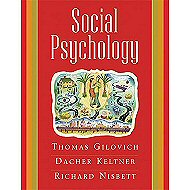|
Social Psychology
|
|
Thomas Gilovich, Dacher Keltner, Richard E. Nisbett
|

|

From the preface
As we were putting the finishing touches on this book, a series of events unfolded in New Orleans, Louisiana, that raised all sorts of social psychological questions and reinforced the importance of studying and understanding social psychological phenomena. […]
The frightening events in New Orleans revealed how much of everyday life depends on invisible norms and social structures that few people can identify or articulate, but that nonetheless guide harmonious human interaction. […]
What are the enduring themes of social psychology? One of them is the extraordinary power that situations can have over people's behavior […] social psychologists have been able to illuminate how subtle changes in the social context or prevailing circumstances dramatically alter people's actions [...]
A second lasting theme of social psychology involves the role of a person's construal of stimuli and prevailing situations - that is, the degree to which a person's understanding of the world is an interpretation that might or might not be shared by others. [...]
Many of the classic studies in social psychology illustrate both of these central themes. […]
Two additional themes have become more and more prominent in social science research in the past decade: (1) the evolutionary context of human behavior, and (2) the remarkable evidence about the difference among cultures in behavior previously assumed to be universal […] We discuss how adaptation to different conditions, may have taken some universal tendencies in different directions based on cultures. […]
We take a particularly close look at two quiet different ways of being human (and all sorts of blends and variations in between these two). One of these is the Western way […] The other is the Eastern way […]
Aside from not having a separate chapter on methods, our text differs from most others in that it has chapters dealing with four emerging bodies of knowledge. […] Studies of different cultures and inquiries about how we have evolved have led to new insight about the self, about our relationships, about the nature and function of our emotional experience, and about our moral judgment [...]
|
|
